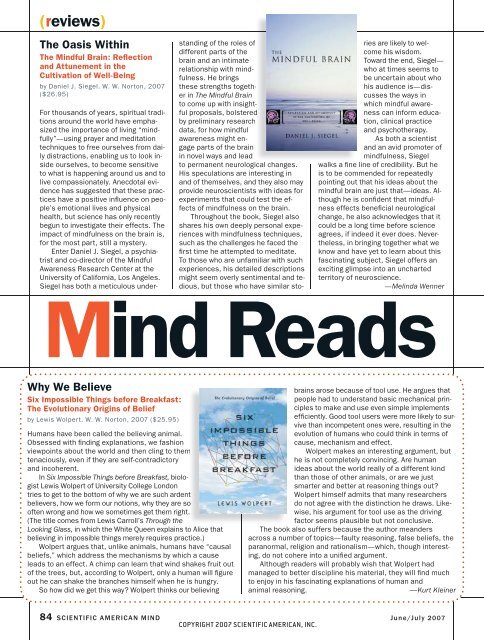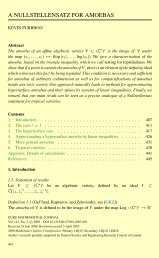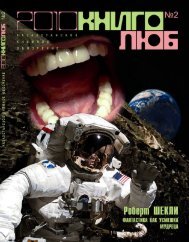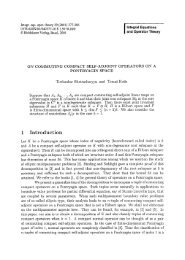Scientific American Mind-June/July 2007
Scientific American Mind-June/July 2007
Scientific American Mind-June/July 2007
You also want an ePaper? Increase the reach of your titles
YUMPU automatically turns print PDFs into web optimized ePapers that Google loves.
(reviews)<br />
The Oasis Within<br />
The <strong>Mind</strong>ful Brain: Refl ection<br />
and Attunement in the<br />
Cultivation of Well-Being<br />
by Daniel J. Siegel. W. W. Norton, <strong>2007</strong><br />
($26.95)<br />
For thousands of years, spiritual traditions<br />
around the world have emphasized<br />
the importance of living “mindfully”—using<br />
prayer and meditation<br />
techniques to free ourselves from daily<br />
distractions, enabling us to look inside<br />
ourselves, to become sensitive<br />
to what is happening around us and to<br />
live compassionately. Anecdotal evidence<br />
has suggested that these practices<br />
have a positive infl uence on people’s<br />
emotional lives and physical<br />
health, but science has only recently<br />
begun to investigate their effects. The<br />
impact of mindfulness on the brain is,<br />
for the most part, still a mystery.<br />
Enter Daniel J. Siegel, a psychiatrist<br />
and co-director of the <strong>Mind</strong>ful<br />
Awareness Research Center at the<br />
University of California, Los Angeles.<br />
Siegel has both a meticulous under-<br />
standing of the roles of<br />
different parts of the<br />
brain and an intimate<br />
relationship with mindfulness.<br />
He brings<br />
these strengths together<br />
in The <strong>Mind</strong>ful Brain<br />
to come up with insightful<br />
proposals, bolstered<br />
by preliminary research<br />
data, for how mindful<br />
awareness might engage<br />
parts of the brain<br />
in novel ways and lead<br />
to permanent neurological changes.<br />
His speculations are interesting in<br />
and of themselves, and they also may<br />
provide neuroscientists with ideas for<br />
experiments that could test the effects<br />
of mindfulness on the brain.<br />
Throughout the book, Siegel also<br />
shares his own deeply personal experiences<br />
with mindfulness techniques,<br />
such as the challenges he faced the<br />
fi rst time he attempted to meditate.<br />
To those who are unfamiliar with such<br />
experiences, his detailed descriptions<br />
might seem overly sentimental and tedious,<br />
but those who have similar sto-<br />
ries are likely to welcome<br />
his wisdom.<br />
Toward the end, Siegel—<br />
who at times seems to<br />
be uncertain about who<br />
his audience is—discusses<br />
the ways in<br />
which mindful awareness<br />
can inform education,<br />
clinical practice<br />
and psychotherapy.<br />
As both a scientist<br />
and an avid promoter of<br />
mindfulness, Siegel<br />
walks a fi ne line of credibility. But he<br />
is to be commended for repeatedly<br />
pointing out that his ideas about the<br />
mindful brain are just that—ideas. Although<br />
he is confi dent that mindfulness<br />
effects benefi cial neurological<br />
change, he also acknowledges that it<br />
could be a long time before science<br />
agrees, if indeed it ever does. Nevertheless,<br />
in bringing together what we<br />
know and have yet to learn about this<br />
fascinating subject, Siegel offers an<br />
exciting glimpse into an uncharted<br />
territory of neuroscience.<br />
—Melinda Wenner<br />
<strong>Mind</strong> Reads<br />
Why We Believe<br />
Six Impossible Things before Breakfast:<br />
The Evolutionary Origins of Belief<br />
by Lewis Wolpert. W. W. Norton, <strong>2007</strong> ($25.95)<br />
Humans have been called the believing animal.<br />
Obsessed with fi nding explanations, we fashion<br />
viewpoints about the world and then cling to them<br />
tenaciously, even if they are self-contradictory<br />
and incoherent.<br />
In Six Impossible Things before Breakfast, biologist<br />
Lewis Wolpert of University College London<br />
tries to get to the bottom of why we are such ardent<br />
believers, how we form our notions, why they are so<br />
often wrong and how we sometimes get them right.<br />
(The title comes from Lewis Carroll’s Through the<br />
Looking Glass, in which the White Queen explains to Alice that<br />
believing in impossible things merely requires practice.)<br />
Wolpert argues that, unlike animals, humans have “causal<br />
beliefs,” which address the mechanisms by which a cause<br />
leads to an effect. A chimp can learn that wind shakes fruit out<br />
of the trees, but, according to Wolpert, only a human will fi gure<br />
out he can shake the branches himself when he is hungry.<br />
So how did we get this way? Wolpert thinks our believing<br />
brains arose because of tool use. He argues that<br />
people had to understand basic mechanical principles<br />
to make and use even simple implements<br />
effi ciently. Good tool users were more likely to survive<br />
than incompetent ones were, resulting in the<br />
evolution of humans who could think in terms of<br />
cause, mechanism and effect.<br />
Wolpert makes an interesting argument, but<br />
he is not completely convincing. Are human<br />
ideas about the world really of a different kind<br />
than those of other animals, or are we just<br />
smarter and better at reasoning things out?<br />
Wolpert himself admits that many researchers<br />
do not agree with the distinction he draws. Likewise,<br />
his argument for tool use as the driving<br />
factor seems plausible but not conclusive.<br />
The book also suffers because the author meanders<br />
across a number of topics—faulty reasoning, false beliefs, the<br />
paranormal, religion and rationalism—which, though interesting,<br />
do not cohere into a unifi ed argument.<br />
Although readers will probably wish that Wolpert had<br />
managed to better discipline his material, they will fi nd much<br />
to enjoy in his fascinating explanations of human and<br />
animal reasoning. —Kurt Kleiner<br />
84 SCIENTIFIC AMERICAN MIND <strong>June</strong>/<strong>July</strong> <strong>2007</strong><br />
COPYRIGHT <strong>2007</strong> SCIENTIFIC AMERICAN, INC.

















